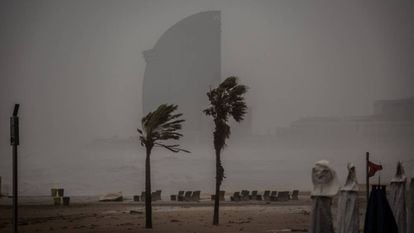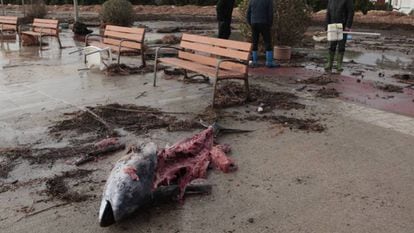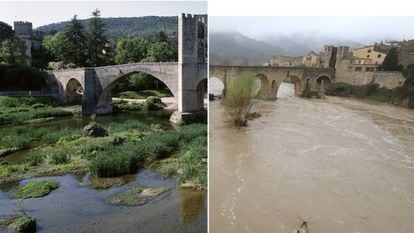A powerful storm that battered Spain this week has claimed at least 13 lives – four people remain missing – and devastated coastal areas along the Mediterranean with record rainfall, wind and waves.
The latest fatality is a fisherman who was dragged out to sea in L’Ametlla de Mar (Tarragona) on Thursday. Authorities are still searching for another sailor who was swept away by a wave in Palamós, a young man who was canyoneering in Mallorca, and two more people who went missing in Ibiza.

Spain’s Prime Minister Pedro Sánchez on Thursday flew over affected areas in Catalonia and surveyed the storm damage in the Balearic Islands. The leader of the Spanish Socialist Party (PSOE) has called an emergency meeting with several members of his cabinet to craft a response to the effects of Storm Gloria.
The unusual weather system has ruined crops, destroyed seaside promenades and damaged beachfront buildings along the 518 kilometers of coastline in the Valencia region. Storm Gloria also affected 699 km of coastline in Catalonia as well as many parts of the Balearic Islands, where some locations were pounded by six-meter waves that swept away entire beaches.
“Prime Minister Pedro Sánchez visiting areas affected by Storm Gloria in Catalonia and the Balearic Islands.”
The regional premier of Valencia, Ximo Puig, on Thursday demanded “swift decisions” from the central government in order to conduct storm restoration in time for the Easter holidays, one of the peak periods for the tourism industry. “With an alliance of the public and private sectors, we will forge ahead. We are saddened by this disaster and the recovery will be very tough, but we are going to rise above this,” said Puig at Fitur, a tourism fair currently taking place in Madrid.
Disaster zones
Numerous municipalities in Catalonia continued to experience travel disruption on Thursday, and 130,000 students stayed home from school. In the city of Girona, authorities said that the Ter River has burst its banks in the neighborhoods of Pedret and Pont Major.
The towns of Deltebre and Alcanar, in Tarragona province, have asked to be declared disaster zones. Early estimates place storm damage in Deltebre, where 25 meters of coastline have been swallowed up and 3,000 hectares of rice fields ruined, in the range of €9.5 million.

The Ebro River Delta region in Catalonia has been severely affected by the storm, which pushed waves as far as three kilometers inland, ruining crops and altering fishing activities in the area. The damage is particularly visible in coastal towns between L’Ampolla and Deltebre, on the left bank of the Ebro. The sea has covered thousands of hectares of rice fields, where the salty water will damage soil fertility.
“This means ruin,” said Josep Colomines, captain of a fishing vessel from L’Ampolla. A dozen red tuna fish lay mangled on the badly damaged seafront promenade, their heads still intact. Knives in hand, several people were busy cutting out the edible parts.

Every beach in the Barcelona Metropolitan Area (AMB), from Castelldefels to Montgat, has sustained the worst damage seen in the last 30 years. According to the AMB’s head of beaches, Dani Palacios, the damage to beach equipment alone is expected to be in excess of €250,000, and that is without counting the destruction of boardwalks and promenades, or the new sand that will have to be brought in to restore the areas to their former state.
Valencia
In the Valencia region, the storm has swallowed up entire beaches and dragged sand, seaweed, cane, driftwood, oil drums and even buoys hundreds of meters inland. In Oliva, where authorities allowed residents to keep homes that were built too close to the coastline, one homeowner begged reporters not to publish photographs of the state of his property “or else they’ll take away even more land from us.”
“I’ve never seen anything like this. Maybe in 1982,” said a woman named Teresa inside one of the few cafeterias still open in the area.
In Jávea, the ground-floor premises of the buildings located along its small port promenade have been ravaged despite efforts to stop the waves with metal sheets and wooden planks. “Never before has there been so much damage, with such strong waves,” said Diego, who works at La Bodeguita, a seafront restaurant in this popular tourist destination.
With reporting by Marta Rodríguez, Ferran Bono and Marc Rovira.
English version by Susana Urra.
